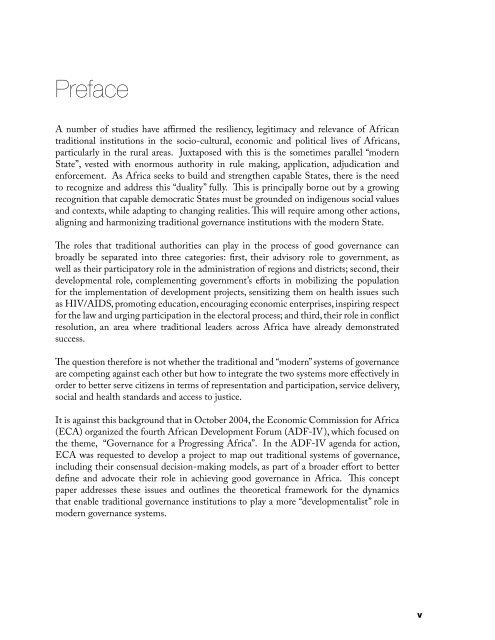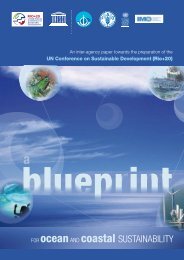Relevance of - United Nations Economic Commission for Africa
Relevance of - United Nations Economic Commission for Africa
Relevance of - United Nations Economic Commission for Africa
You also want an ePaper? Increase the reach of your titles
YUMPU automatically turns print PDFs into web optimized ePapers that Google loves.
Preface<br />
A number <strong>of</strong> studies have affirmed the resiliency, legitimacy and relevance <strong>of</strong> <strong>Africa</strong>n<br />
traditional institutions in the socio-cultural, economic and political lives <strong>of</strong> <strong>Africa</strong>ns,<br />
particularly in the rural areas. Juxtaposed with this is the sometimes parallel “modern<br />
State”, vested with enormous authority in rule making, application, adjudication and<br />
en<strong>for</strong>cement. As <strong>Africa</strong> seeks to build and strengthen capable States, there is the need<br />
to recognize and address this “duality” fully. This is principally borne out by a growing<br />
recognition that capable democratic States must be grounded on indigenous social values<br />
and contexts, while adapting to changing realities. This will require among other actions,<br />
aligning and harmonizing traditional governance institutions with the modern State.<br />
The roles that traditional authorities can play in the process <strong>of</strong> good governance can<br />
broadly be separated into three categories: first, their advisory role to government, as<br />
well as their participatory role in the administration <strong>of</strong> regions and districts; second, their<br />
developmental role, complementing government’s ef<strong>for</strong>ts in mobilizing the population<br />
<strong>for</strong> the implementation <strong>of</strong> development projects, sensitizing them on health issues such<br />
as HIV/AIDS, promoting education, encouraging economic enterprises, inspiring respect<br />
<strong>for</strong> the law and urging participation in the electoral process; and third, their role in conflict<br />
resolution, an area where traditional leaders across <strong>Africa</strong> have already demonstrated<br />
success.<br />
The question there<strong>for</strong>e is not whether the traditional and “modern” systems <strong>of</strong> governance<br />
are competing against each other but how to integrate the two systems more effectively in<br />
order to better serve citizens in terms <strong>of</strong> representation and participation, service delivery,<br />
social and health standards and access to justice.<br />
It is against this background that in October 2004, the <strong>Economic</strong> <strong>Commission</strong> <strong>for</strong> <strong>Africa</strong><br />
(ECA) organized the fourth <strong>Africa</strong>n Development Forum (ADF-IV), which focused on<br />
the theme, “Governance <strong>for</strong> a Progressing <strong>Africa</strong>”. In the ADF-IV agenda <strong>for</strong> action,<br />
ECA was requested to develop a project to map out traditional systems <strong>of</strong> governance,<br />
including their consensual decision-making models, as part <strong>of</strong> a broader ef<strong>for</strong>t to better<br />
define and advocate their role in achieving good governance in <strong>Africa</strong>. This concept<br />
paper addresses these issues and outlines the theoretical framework <strong>for</strong> the dynamics<br />
that enable traditional governance institutions to play a more “developmentalist” role in<br />
modern governance systems.
















